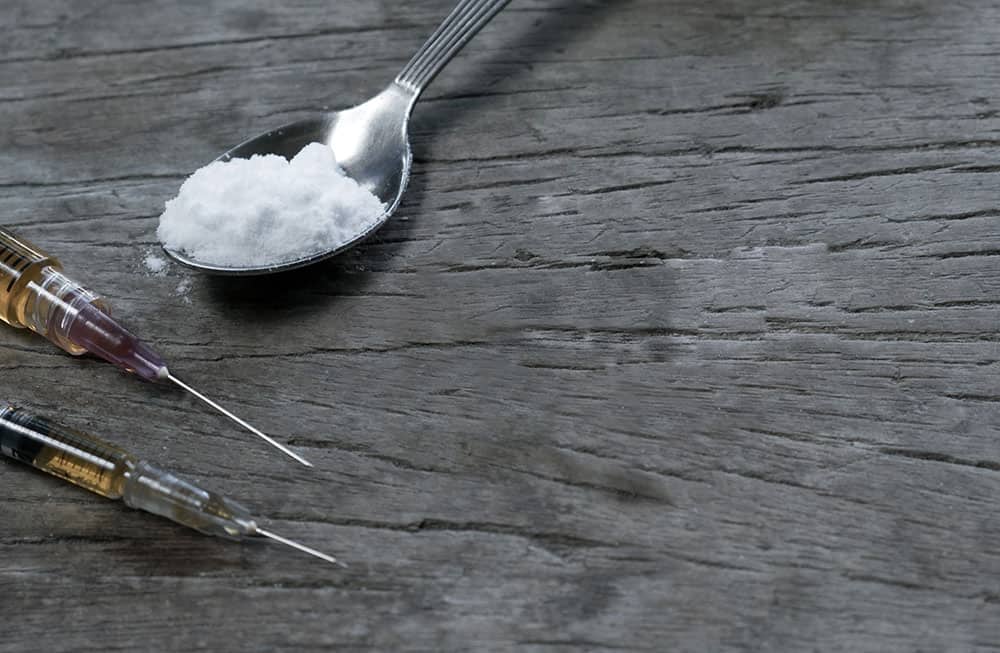Northbound Treatment Services has been dedicated to helping those who suffer from addiction for over 25 years. We have been working to offer hope and assistance through heroin detox and other opiate addiction treatment programs.
Our team understands the overwhelmingly addictive and devastating properties of drugs like heroin. So, as a service to anyone who is seeking information and support for heroin addiction and recovery, Northbound Treatment Services provides a brief guide on the effects of this drug.
What is Heroin?
Heroin is a highly addictive drug that is derived from morphine, which is a naturally occurring chemical found in certain types of poppy plants. It possesses the most rapid action of any of the opiates. Heroin is usually sold in the form of a white or brown powder. It may also be found as a black sticky substance that is commonly referred to on the streets as black tar heroin.
Pure heroin is usually seen in the form of a white powder and has a very bitter taste. Although it’s possible to find this form of this drug, most heroin that is sold on the street is mixed with or “cut” by substances like starch, powdered milk, sugar, or quinine. Sometimes, heroin is mixed with fentanyl, a very powerful synthetic opioid.
Heroin may be produced from strychnine or other poisons or other poisons as well. Since users cannot determine the strength or chemical make-up of the drug, they are at risk of overdose or death.
This drug is illegal, so individuals who use it usually acquire it on the streets. Heroin’s highly addictive nature often causes people to become dependent on it fairly quickly. Some individuals may begin to develop an addiction to heroin after using this drug for a rather short amount of time.
Heroin Use in the U.S.
According to a survey from the National Survey on Drug Use and Health regarding drug use in 2016, about 948,000 people in America reported that they had used heroin. Around 170,000 individuals had used the drug for the first time that year. The majority of those who were using heroin were between the ages of 18 and 25; however, younger and older individuals were also involved in heroin use.
Centers for Disease Control and Prevention states that, in 2017, about 494,000 individuals in America reported that they had used heroin in the past year. Those counted in the survey were either 12 years of age or older, proving that harmful drugs like heroin do not discriminate; individuals of all ages are subject to the effects of substance abuse and addiction.
How is Heroin Used?
Heroin is most often injected, but users may also snort or smoke this drug. Those who suffer from heroin abuse and addiction may inject it up to 4 times every day. Intravenous injection is the most common method of heroin use because it produces the most intense effects the fastest.
Users who inject heroin typically feel the effects in 7 to 8 seconds. The effects of an intramuscular injection are usually experienced within about 5 to 8 seconds. Those who smoke or snort heroin usually feel the peak effects of the drug within 10 to 15 minutes.
The abuse patterns have shifted in recent years, encompassing a widely varied group of users. Lower prices have increased the appeal of the drug. Some users smoke or snort heroin because they believe there is less chance for addiction if they use the drug in these ways. Still, individuals who abuse heroin often find themselves suffering from the negative short-term and long-term effects of use.
Identifying the Short-Term Effects of Heroin
Shortly after a person uses heroin, the drug binds to opioid receptors in the brain. This produces a sense of euphoria, which is the “feel good” sensation users tend to enjoy. Euphoria is also referred to as a “high” or a “rush”.
This state of euphoria is often accompanied by some other short-term effects:
- Dry mouth
- Nausea
- Vomiting
- Drowsiness
- Warm, flushed skin
- Slowed heart rate
- Shallow breathing
- Excessive itchiness
- Heaviness in arms and legs
Long-Term Effects and Health Consequences of Heroin Use
Since heroin is such an addictive drug, it’s not difficult to become dependent on and addicted to it. Individuals who abuse heroin and use it regularly will eventually find that the drug has very adverse lasting effects. Heroin is a powerful drug that can cause many issues in people’s lives. The use of this drug often leads to emotional, mental, and physical consequences.
Long-term use of heroin may result in the following problems:
- Neurochemical imbalances in the brain
- Compulsive drug use
- Physical dependence
- Addiction
- High risk of infectious diseases
- Collapsed veins
- Bacterial infections
- Abscesses
- Infection of heart lining and valves
- Arthritis and other rheumatologic problems
This drug can cause permanent changes in the lives of those who abuse it. Many individuals lose their jobs and have financial problems as a result of heroin addiction. When a person is physically dependent on heroin, it can be difficult to think of anything besides the next opportunity for drug use. So, instead of focusing on getting to work or paying for food and shelter, many individuals use their funds to pay for more heroin.
Families may be torn apart because of substance use problems. This happens due to the fact that drugs such as heroin have a way of changing people in negative ways. Using this drug may lead to behavioral changes; individuals may become irritable, forget about important responsibilities, and spend more time searching for the next “high” than being with loved ones.
People who suffer from addiction often begin to feel isolated and alone. Their loved ones and friends may not truly understand the struggle of addiction; people often feel that a person can end substance abuse if they simply try to do so. But, this isn’t the case and this misunderstanding often causes people who are suffering from addiction to sink farther into the world of substance use.
Individuals may become depressed and, as a result, use more heroin or even other drugs in order to escape from their heartache. But, this is not the answer to the problems caused by addiction. Instead, people who are suffering from these issues can find hope and help from treatment centers like ours here at Northbound Treatment Services.
Addressing More Health Concerns
Heroin abuse during pregnancy has been known to result in low birth weight and other complications. Infants who are born to heroin addicts experience dangerous withdrawal symptoms that may be deadly. Heroin addiction treatment can be administered during pregnancy but infants exposed to methadone during pregnancy usually require treatment for withdrawal symptoms.
Heroin users who use the drug through intravenous injection are at risk for infection of HIV and Hepatitis C. This is often the result of sharing needles and syringes. It is estimated that between 70 and 80 percent of new hepatitis C infections occurring in the United States each year ar the result of intravenous drug use.
Heroin Treatment Options
The National Institute on Drug Abuse has stated that clinical trials have proven buprenorphine to be effective in opiate detoxification. It is the active ingredient in Suboxone. Buprenorphine has become a widely accepted alternative to methadone. It is viewed as much safer and has a dosage ceiling that limits the euphoric effects.
When opiates bind to opiate receptors in the body, it stimulates the release of dopamine which is responsible for the euphoria experienced when using opiates. As the drugs leave the system, the opiate receptors become empty and withdrawal ensues. The buprenorphine in Suboxone attaches to those empty receptors to inhibit cravings and withdrawals without producing the euphoria.
Even if the patient consumes other opiates while taking Suboxone, the receptors are blocked, so individuals won’t experience euphoric effects. The FDA approved buprenorphine for treatment of opioid addiction in 2002. Methadone has proven to be as addictive as other opiates. This has led to Suboxone becoming more widely used than methadone to treat opiate dependence.
Here at Northbound Treatment Services, we offer treatment programs for those who are addicted to opioid drugs. We provide unique treatment plans in a caring, compassionate environment. Through our treatment program, individuals can benefit from a variety of therapies and treatment options, including medication-assisted detoxification and stabilization, individual therapy, and group therapy.
Contact us today and allow us to help you move toward a life that is totally free from the bondage of addiction!
References:
https://www.drugabuse.gov/publications/research-reports/heroin/scope-heroin-use-in-united-states
https://www.drugabuse.gov/publications/research-reports/heroin/overview
Author
-

President, CEO & Founder at Northbound Treatment Network
Paul Alexander is the CEO, President & Founder of Northbound Treatment Network in Newport Beach, California. He believes wholeheartedly in transformational leadership, organizational health and effective, fully integrated substance use disorder and mental health treatment. With over 27 years of experience in behavioral healthcare, Paul has extensive knowledge of “in vivo” treatment modalities, clinical development, operations, strategy, marketing and financial planning. He has been widely recognized for his development of collegiate-based residential treatment programs for students in recovery and authored a research study at The University of California confirming this modality’s effectiveness.
Paul’s comprehensive professional experience, willingness to innovate, and emphasis on organizational health are vital factors in Northbound’s continued success. Paul received his Certified Addiction Treatment Specialist training at Saddleback College in Mission Viejo, CA, and was awarded Outstanding Alumni Service Award in 2002. Paul holds a Bachelor of Arts degree in Criminology, Law and Society, Summa Cum Laude, from University of California, Irvine, and a Juris Doctorate degree from Loyola Law School of Los Angeles. Paul currently serves on The National Association of Addiction Treatment Providers (NAATP) board. In addition, he serves on The Family Recovery Foundation board and The CarePossible board in Orange County; both organizations are committed to raising funds for family recovery and treatment for former military personnel. Paul is in recovery himself and lives in Orange County with his wife Silvana and his two young sons, Noah and Dean.







